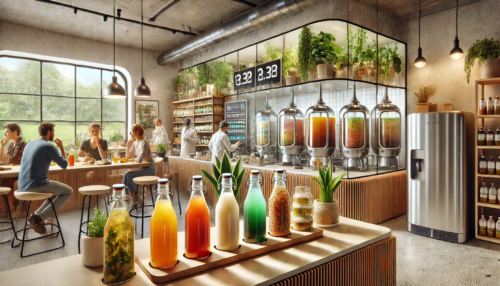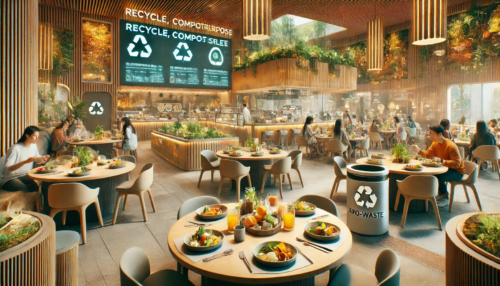AI-Powered Nutrition: Personalized Diets for a Healthier Future
In 2025, personalized nutrition is no longer a luxury but a practical reality, thanks to advancements in artificial intelligence (AI). By analyzing genetic makeup, lifestyle habits, and real-time health data, AI creates customized diets tailored to individual needs. This revolutionary approach is transforming how we think about food, health, and well-being.
Imagine a diet plan that adapts dynamically to your body’s current needs—whether it’s stabilizing your blood sugar, enhancing athletic performance, or reducing stress. AI-powered nutrition is shaping the future of health and bringing precision to dietary recommendations.
How AI is Transforming Nutrition
Simplifying the Science of Personal Diets
AI-driven nutrition tools integrate vast amounts of data, from your genetic profile to daily activity levels, to craft tailored diet plans. Unlike traditional diets that rely on general advice, these systems focus on precision, ensuring optimal results.
Why AI Matters in Nutrition:
- Tailored Recommendations: Everyone’s body is different, and AI ensures that diets reflect those differences.
- Real-Time Adjustments: AI can modify plans based on changes in activity, stress, or health metrics.
- Efficiency: AI processes data quickly, delivering actionable insights for better health.
Companies like Neurance.ai and Precision Nutrition Systems are at the forefront of this change, using AI algorithms to make nutrition smarter and more accessible.
The Process: How Personalized Diet Plans Work
1. Understanding Your Genetics
AI starts with genetic analysis, uncovering predispositions like lactose intolerance, gluten sensitivity, or metabolic efficiency. This data forms the foundation for a diet tailored to your biology.
2. Monitoring Real-Time Health Metrics
Wearables such as fitness trackers and glucose monitors provide AI systems with up-to-date information about your physical state. These insights help AI make adjustments to your nutrition plan as needed. For instance:
- High blood sugar? A protein-rich snack might be recommended.
- Low energy levels? AI could suggest foods high in magnesium or complex carbs.
3. Behavioral Insights
AI also takes your habits and preferences into account. By analyzing when and what you eat, it ensures that your diet is sustainable and enjoyable.
The Benefits of AI Nutrition
The advantages of AI-driven diets go beyond convenience:
- Improved Health Outcomes: AI helps manage chronic conditions like diabetes, heart disease, and obesity.
- Sustainability: AI encourages reducing food waste through precise portioning and smart ingredient choices.
- Accessibility: Once expensive, AI-powered tools are now becoming more affordable and user-friendly.
Ethical Considerations and Challenges
While the promise of AI in nutrition is exciting, it comes with challenges:
- Data Privacy: Sharing sensitive genetic and health information raises concerns about security.
- Algorithm Bias: If not carefully designed, AI systems could produce biased recommendations.
- Dependence on Technology: Over-reliance on AI might lead to ignoring professional medical advice.
Collaborations between governments, tech companies, and healthcare providers are critical to addressing these issues and ensuring AI-driven nutrition benefits everyone.
Real-World Applications of AI Nutrition
In Healthcare
Hospitals are using AI to create meal plans for patients with complex needs, such as kidney disease or cancer, improving recovery rates and quality of care.
For Athletes
AI helps athletes optimize their diets based on training schedules and recovery needs, enhancing performance and endurance.
Everyday Consumers
Apps like MyFitnessPal and Fitbit now integrate AI to provide personalized meal suggestions, making advanced nutrition accessible to all.
What the Future Holds
By 2030, AI in nutrition could become even more advanced, incorporating microbiome analysis and virtual reality tools to make nutrition education interactive. Personalized diets might also intersect with lab-grown foods, creating meals that are not only healthy but environmentally sustainable.
FAQs: Everything You Need to Know About AI Nutrition
1. What is AI-powered personalized nutrition?
AI-powered nutrition uses artificial intelligence to analyze health data, genetics, and lifestyle habits to create tailored diet plans.
2. Is AI nutrition safe?
Yes, when used responsibly. Reputable platforms ensure data privacy and base recommendations on verified scientific research.
3. Can AI replace dietitians?
AI complements dietitians by providing data-driven insights but cannot replace the expertise of healthcare professionals.
4. How can I access AI-powered nutrition?
Many apps and services, like Neurance.ai and Fitbit, offer AI-based diet planning tools. Genetic testing kits can provide additional data for customization.
5. Are these services expensive?
While some services may still be premium, increasing accessibility and competition are driving down costs.
Additional Resources
For further reading, explore these sources:
- National Library of Medicine: Role of AI in Nutrition
- Precision Nutrition Report by Business Research Company
- Neurance AI: Personalized Nutrition Solutions
- The Role of AI in Healthcare
Conclusion: Smarter Nutrition, Healthier Lives
AI-powered nutrition represents a paradigm shift in health and wellness. By tailoring diets to individual needs, it ensures better health outcomes, greater sustainability, and a more personalized approach to food. As technology continues to advance, the possibilities for AI in nutrition are endless—and the benefits, transformative.




